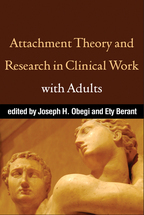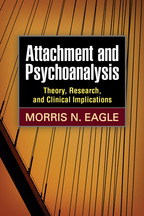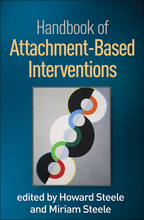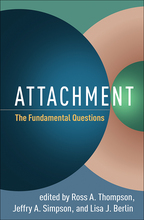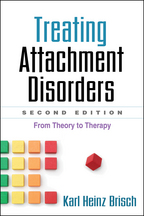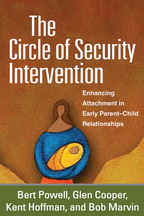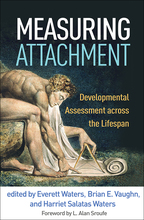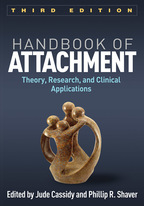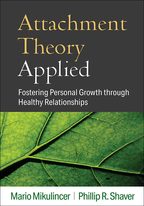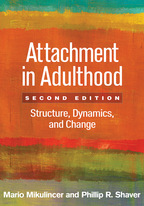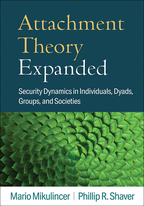Attachment Theory and Research in Clinical Work with Adults
Edited by Joseph H. Obegi and Ety Berant
HardcoverPaperbacke-bookprint + e-book
Hardcover
orderDecember 10, 2008
ISBN 9781593859985
Price: $108.00 529 Pages
Size: 6⅛" x 9¼"
Paperback
orderJune 9, 2010
ISBN 9781606239285
Price: $72.00529 Pages
Size: 6⅛" x 9¼"
“Provides a sophisticated and comprehensive review of attachment research and practice as it applies to a wide range of areas. The book is unique in that it addresses domains that have not been attended to in other similar volumes, including psychodynamic aspects of attachment in transference and deference, and the application of attachment theory to interpersonal therapy, and application of attachment theory to cognitive behavioural therapy. The chapters provide a nice integration of theoretical concepts, practice applications through case illustrations, and current research to support it. The book would appeal to experienced clinicians, academics, and researchers....The book maintains high standards of scholarship and clinical complexity throughout, and is highly recommended.”

—Journal of Psychological Medicine
“Very interesting and relevant, certainly to psychoanalysts, not least because it does focus, comprehensively and in depth, on the role of attachment theory in working with adults who have Axis II pathology, particularly in the areas of narcissistic pathology.”

—American Academy of Psychoanalysis and Dynamic Psychiatry Forum
“A comprehensive text that offers clinicians the concepts and information necessary to conceptualize their adult clients through the lens of attachment theory. Coeditors Joseph H. Obegi and Ety Berant have compiled 19 chapters that provide readers with informative ideas on how to effectively understand their adult clients, as well as offer suggestions on how to impart meaningful treatment to clientele by considering client attachment styles. Each informative chapter is written by experienced clinicians who not only explain research and ideas efficiently but also provide clinical examples to better illustrate the concepts introduced in the chapter....Throughout this entire book, readers are constantly reminded of how valuable knowledge in the area of attachment is to clinicians and their clients. The ideas, research, and concepts presented can be used by any practitioner to enhance their understanding of clients through the framework of attachment. In addition, the information learned through reading this book can be used as a tool for effectively working through presenting problems that may be at an impasse due to attachment-related issues. All of the ideas in this book are centered on effective client care, have support in research, and are illustrated with clear and specific case examples. Perhaps one of the most valuable assets of this book is that nearly every chapter ends with a section that offers clinical case examples experienced by the contributing authors. Nearly all chapters have a specific therapeutic example or case dialogue that clearly describes the ideas in the chapter so that readers can visualize how the concept may be presented in the therapeutic setting or how the attachment-related techniques look in action....The coeditors of this text have done a wonderful job in overseeing the collaboration of the many clinicians that have a voice in the book. This is an excellent text and resource to add to the clinical library of any clinician, educator, and student.”

—Family Journal
“This book opens up the 'black box' of attachment study for practicing clinicians of all stripes. Grounded in cutting-edge research, and rich in clinical material, the volume both anchors the reader in the core elements of attachment theory and research and brings alive the multiple and diverse implications of this work for the therapeutic enterprise.”

—Arietta Slade, PhD, Doctoral Program in Clinical Psychology, City University of New York
“One does not often apply the term 'page turner' to a professional volume, but I literally couldn't put this book down. Every chapter includes explicit, practical, and thoughtful strategies for formulating and intervening from an attachment framework. I've already been thinking about how to incorporate these ideas into my teaching and clinical work!”

—Hanna Levenson, PhD, private practice, San Francisco, and Professor, Wright Institute, Berkeley, California
“This comprehensive volume stands as the state-of-the-art guide to the clinical applications of attachment theory. Psychologists and other mental health professionals practicing assessment, evaluation, and the full range of contemporary approaches to psychotherapy will repeatedly turn to this well-organized work. Obegi and Berant have brought together the leading experts in each area of practice and scholarship. At a time when psychotherapists are concerned about establishing meaningful links with empirical research, this impressive book is especially necessary.”

—Lewis Aron, PhD, Director, Postdoctoral Program in Psychotherapy and Psychoanalysis, New York University
—Journal of Psychological Medicine
“Very interesting and relevant, certainly to psychoanalysts, not least because it does focus, comprehensively and in depth, on the role of attachment theory in working with adults who have Axis II pathology, particularly in the areas of narcissistic pathology.”
—American Academy of Psychoanalysis and Dynamic Psychiatry Forum
“A comprehensive text that offers clinicians the concepts and information necessary to conceptualize their adult clients through the lens of attachment theory. Coeditors Joseph H. Obegi and Ety Berant have compiled 19 chapters that provide readers with informative ideas on how to effectively understand their adult clients, as well as offer suggestions on how to impart meaningful treatment to clientele by considering client attachment styles. Each informative chapter is written by experienced clinicians who not only explain research and ideas efficiently but also provide clinical examples to better illustrate the concepts introduced in the chapter....Throughout this entire book, readers are constantly reminded of how valuable knowledge in the area of attachment is to clinicians and their clients. The ideas, research, and concepts presented can be used by any practitioner to enhance their understanding of clients through the framework of attachment. In addition, the information learned through reading this book can be used as a tool for effectively working through presenting problems that may be at an impasse due to attachment-related issues. All of the ideas in this book are centered on effective client care, have support in research, and are illustrated with clear and specific case examples. Perhaps one of the most valuable assets of this book is that nearly every chapter ends with a section that offers clinical case examples experienced by the contributing authors. Nearly all chapters have a specific therapeutic example or case dialogue that clearly describes the ideas in the chapter so that readers can visualize how the concept may be presented in the therapeutic setting or how the attachment-related techniques look in action....The coeditors of this text have done a wonderful job in overseeing the collaboration of the many clinicians that have a voice in the book. This is an excellent text and resource to add to the clinical library of any clinician, educator, and student.”
—Family Journal
“This book opens up the 'black box' of attachment study for practicing clinicians of all stripes. Grounded in cutting-edge research, and rich in clinical material, the volume both anchors the reader in the core elements of attachment theory and research and brings alive the multiple and diverse implications of this work for the therapeutic enterprise.”
—Arietta Slade, PhD, Doctoral Program in Clinical Psychology, City University of New York
“One does not often apply the term 'page turner' to a professional volume, but I literally couldn't put this book down. Every chapter includes explicit, practical, and thoughtful strategies for formulating and intervening from an attachment framework. I've already been thinking about how to incorporate these ideas into my teaching and clinical work!”
—Hanna Levenson, PhD, private practice, San Francisco, and Professor, Wright Institute, Berkeley, California
“This comprehensive volume stands as the state-of-the-art guide to the clinical applications of attachment theory. Psychologists and other mental health professionals practicing assessment, evaluation, and the full range of contemporary approaches to psychotherapy will repeatedly turn to this well-organized work. Obegi and Berant have brought together the leading experts in each area of practice and scholarship. At a time when psychotherapists are concerned about establishing meaningful links with empirical research, this impressive book is especially necessary.”
—Lewis Aron, PhD, Director, Postdoctoral Program in Psychotherapy and Psychoanalysis, New York University

